Effects of Divorce on Children & Tips to Help Them Cope

The impact of divorce on children varies significantly from child to child, depending on different factors. Some children might struggle with accepting the situation, while others might find it emotionally draining. Younger children may regress in behavior, whereas teenagers might act out in rebellion. However, it is rare for one child to face all the below-discussed side effects of divorce simultaneously. Parental conflict, changes in living arrangements, and financial instability can further influence a child’s reaction. Understanding these potential challenges can help parents provide better emotional support. If you are going through a divorce, being aware of these negative effects of divorce on children allows you to take proactive steps to minimize distress and foster resilience in your children.
Side Effects of Divorce on Children
Knowing the side effects of divorce will better equip you to deal with your child in the most positive manner possible. The short-term effects of divorce are mostly psychological effects of divorce on children, while the long-term effects are the repercussions of divorce.
Short-term Effects:
- Anxiety: Separation anxiety is an expected reaction to the breakdown of trust that children experience when their parents separate. Also, till the complete proceedings of the court are over, a lot of things remain uncertain and unclear in the child’s mind. And a child without answers is bound to be anxious most of the time.
- Constant Stress: Divorce is a stressful experience both for parents and children. It is possible to reduce the stress that children experience during this time through proper communication. Assuring them that they will be loved unconditionally by both parents in spite of the divorce is essential. It is important to emphasize that the child is in no way to be blamed for the divorce, and the unhappiness is in no way related to them.
- Intense Sadness: Feeling sad during a divorce is a completely expected reaction in children. While they eventually get over it, it is important to let them find healthy and acceptable ways to deal with sadness. The sadness can take an extreme manifestation in the form of depression. It is important to seek counselling if it happens.
- Mood Swings: The discomfort due to divorce can manifest in the form of mood swings and irritability in children. The anger or irritability is a mask for anger at the situation, while some children can also become withdrawn. Therefore, it is important to provide them with channels of communication and let them understand the cause of divorce. It is a situation where they need love and support from both parents.
- Distress: This is seen in children whose parents go through a divorce involving custody battles and visitation issues. Other factors, such as the level of marital conflict, violence against a partner or child, and the parent’s mental health, can all contribute to aggravating the distress.
Long-Term Effects:
- Substance Abuse: Research has shown that both sons and daughters of divorced families are more likely to smoke. Of children dealing with a divorce, there is a 48% chance that the boys will smoke before they turn 18, and a 39% chance that girls will. They are also more prone to give in to alcohol and other addictive substances.
- Poor Social Skills: Children from divorced families tend to develop trust issues and hence make less social contacts. As they grow up, they might have difficulties in building intimate relationships. The probability of divorce amongst such children is twice as high compared to children from stable families.
- Poor Education: The age of the child at which the parents divorce each other also has an impact. Younger children suffer more. The more the number of changes that the child has to adapt to, the more the difficulty faced at school. Boys may turn aggressive and have a problem getting along with peers and teachers. While girls tend to become sad or depressed.
- Depression: Sadness which is a short-term effect of divorce has chances of turning into depression in the long run. It has been shown that children who witnessed their parent’s divorce have a higher chance of falling into depression and social withdrawal. Studies show that divorce can be a contributing factor in bipolar disorder in children.
- Socioeconomic Disadvantage: The trauma of divorce can impact or stunt a child’s progress in school. This, in turn, can affect their college education and further development in life. Similarly, when parents from lower strata of economy divorce, the custodian of the child are likely to face financial problems that can impact the child’s education.
Factors That Play a Crucial Role in the Way Divorce Affects Children
The crucial elements that come into play during divorce include:
- Age at Divorce: Early findings stated that separation from parents at a very young age had more negative effects. But since, it has been proven that in the later years these kids appeared more well-adjusted than their older counterparts. In general, younger kids tend to have problems with personal adjustment and relationships. While adolescents tend to have difficulties in sexual relationships and develop anti-social behaviour.
- Socio-economic Status: It is seen that children from poorer socio-economic backgrounds experience greater hardships after their parent’s divorce. The economic deprivation along with parental hostilities take a toll on the custodial parent which leads to a poorer adjustment in children. The socioeconomic background also influences the intellectual, academic and personal development of children.
- Gender: Surveys and studies have reported contradictory conclusions on the effect of divorce on boys and girls. Some surveys report that boys have a tougher time adjusting post-divorce of parents, while others suggest girls have more difficulties. Finally, some studies found no differences in both the gender’s adjustment mechanism.
- Child’s Personality: Each child has a different personality and therefore reacts differently to situations. Even within a family, children can be affected differently by divorce. A child’s method of dealing with stress can also affect the post-divorce situation.
Are There Any Positive Effects of Divorce on Children?
While divorce is often viewed as a negative experience for children, it can sometimes lead to positive outcomes—especially in high-conflict, abusive, or unhealthy relationships. Below are some potential benefits divorce may have on children.
1. Escape From a Toxic or Abusive Environment
When a marriage is marked by substance abuse, disrespect, or domestic violence, divorce can provide a safer and healthier home for children. They are more likely to live with the more stable parent, reducing exposure to harmful behaviors. This cleaner environment can help them recognize the negative impacts of substance abuse, making them less likely to engage in such habits later in life.
2. Reduced Exposure to Parental Conflict
Children no longer have to witness constant arguments, hostility, or violence between their parents post-divorce. With both parents living separately, they can move on and find emotional stability. A more peaceful home life often leads to happier, more well-adjusted children, especially when they spend quality time with each parent individually.
3. More Quality Time With Each Parent
After divorce, children often get dedicated one-on-one time with each parent. Without the distractions of marital tension, parents can focus more on their kids, leading to stronger individual bonds. This undivided attention can improve emotional connection and provide children with a greater sense of security.
4. Positive Role Modeling for Healthy Relationships
When parents leave an unhealthy marriage, they demonstrate that it’s okay to walk away from toxic situations. Children learn that happiness and self-respect are important, and they may grow up with healthier relationship expectations. Seeing a parent rebuild their life can also teach resilience and adaptability.
5. Opportunity for a Fresh Start
Divorce can allow parents to find new happiness—whether alone or in a healthier relationship. Children observe that life continues after difficult changes and that new beginnings are possible. This can instill hope and a positive outlook on overcoming challenges in their own lives.
6. Development of Emotional Resilience
Navigating divorce can help children build coping skills and emotional strength. They learn to adapt to change, manage difficult emotions, and develop problem-solving abilities. With proper support, this experience can make them more resilient in facing future adversities.
How to Reduce a Child’s Suffering in Parental Separation
Children have tender minds and are not as socially or emotionally strong as full-grown adults. The impacts that divorce leaves on their minds can be deep and irreversible. Here’s how you can try to reduce the severity of the impact.
- Show Quality Parenting: Clinical studies have shown that quality parenting before and after divorce can help the child to deal with the situation. Quality parenting should be a combination of warmth and nurturing along with effective discipline and limit setting. One of the important ways parents can be reassuring in the face of divorce is by affirming their love for children. Even if teenagers show distaste toward affectionate gestures, it will do good for them to be expressively shown a parent’s love, to reduce the effects of divorce on grown children. Setting up some family traditions to spend time together also helps. Another side of effective parenting involves discipline, which sets clear guidelines, limits and age-appropriate restrictions in place. It is important for the children to understand that all feelings are okay, while all behaviours are not. Parents should also be able to maintain an open channel of communication with children. This is also a time that children learn to be empathetic, to understand how to solve problems and which problems cannot be solved.
- Understand Hidden Emotions: Studies have shown that parents often fail to understand the causes of stress in children and also how much their stress has changed over the last year. There is a disconnect between what parents believe to cause worry and what is worrisome for children. One way the parent can understand the child’s emotions is by helping him/her to identify and name their feelings. This calms their amygdala, increases activity in the prefrontal cortex and helps them in developing neural pathways for dealing with strong emotions, problem-solving and rational thinking. Children often need time to completely express themselves, and they do so when they believe their parents will listen patiently without judgment.
- Manage Conflict: How parents deal with a marriage that has come to an end and go about beginning a new life can have a huge impact on children. A responsible parent protects a child from abuse and shows due respect to the child’s other parent. There are a number of effects of parental separation on child development, but it is essential to protect a child from an abusive or violent marriage. The parents can protect a child from the conflicts of marriage is by reframing their relation to a business-like partnership for parenting. In high conflict relationships, parallel parenting can be adopted where parents have minimal contact with each, while the child gets to spend one on one time with each parent. Mediation is an effective tool in such situations. It is seen that after years of mediation the parents are better able to co-parent and resolve conflicts as compared to a litigation control group.
- Consider Intervention Programs: Preventive interventions have a positive impact on kids, these programs help them by reducing their sense of isolation and clarifying misconceptions. These programs also teach children to communicate with parents, solve problems and develop life skills useful for such uncertain situations in life. There are intervention programs for parents as well, that helps them to reframe their relationship post-divorce in the most positive manner. These sessions provide positive and empowering messages to parents about the impact of their actions on children and the different factors they can control in the situation.
- Build Healthy Child-Parent Relationship: A healthy child-parent relation is an important protective factor that predicts the long-term effect of divorce on children. The surveys show that parent-child relation tends to deteriorate after divorce, especially relations with father. Steps such as spending quality one on one time with the parent, affirming their strengths, accepting ambivalent feelings etc. can help the relationship. Also, incorporate genuine expressions of appreciation and encouragement for one another. Another social effect of divorce on children occurs when parents rush into a relationship immediately after the divorce. Most children might encounter an enormous sense of loss and a fear of being replaced by the new partner. The issue is compounded when the new partner also has children.
- Celebrate Small Wins: Celebrating small wins helps children build confidence and resilience during the upheaval of parental separation. Rather than focusing solely on major milestones, acknowledge everyday efforts—such as adapting to a new schedule, managing emotions during transitions, or cooperating with changed routines. Specific, genuine praise reinforces positive behavior and helps children associate adjustment with pride rather than stress. This approach validates their struggles while emphasizing their capability to adapt, fostering emotional security during a turbulent time.
FAQs
1. How does divorce affect a child’s future romantic relationships?
Research suggests children of divorce may develop different attachment styles or relationship expectations. Some become more resilient and selective, while others struggle with trust or fear of abandonment. The long-term impact often depends on how parents modeled healthy conflict resolution post-divorce.
2. Can divorce improve a child’s emotional intelligence?
In some cases, children who navigate divorce with support develop stronger empathy, adaptability, and emotional awareness. Exposure to managed stress—when handled constructively—can teach problem-solving and emotional regulation skills that benefit them in adulthood.
3. Do children of divorce respond differently based on their birth order?
Birth order may influence reactions: older children often take on caretaker roles, middle kids may act as mediators, and younger children might regress or cling. However, individual temperament and parental attention play larger roles than birth order alone.
This was all about the impact of parents’ divorce on children. Divorce is a tough time for everyone involved. Children require extra support and love in such a situation. Parents going through a divorce have to be extra attentive toward them, in spite of the fact that the divorce is a hard situation for them too. There are facilities such as counselling and intervention that can help make the situation easier to handle for both parents and children.
Also Read:
Mental Illness in Children
Parental Pressure on Kids
Role of Parents in Child Development
Factors Affecting Child Growth and Development
Negative Effects of Parents Fighting in Front of Children
Was This Article Helpful?
Parenting is a huge responsibility, for you as a caregiver, but also for us as a parenting content platform. We understand that and take our responsibility of creating credible content seriously. FirstCry Parenting articles are written and published only after extensive research using factually sound references to deliver quality content that is accurate, validated by experts, and completely reliable. To understand how we go about creating content that is credible, read our editorial policy here.






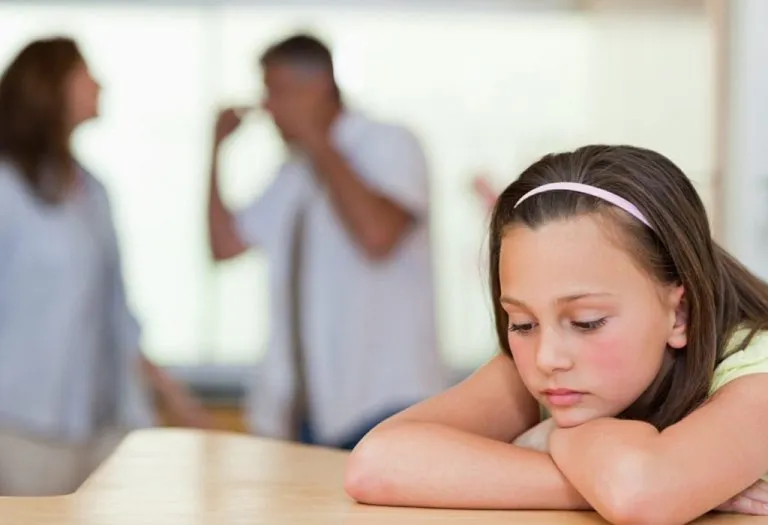
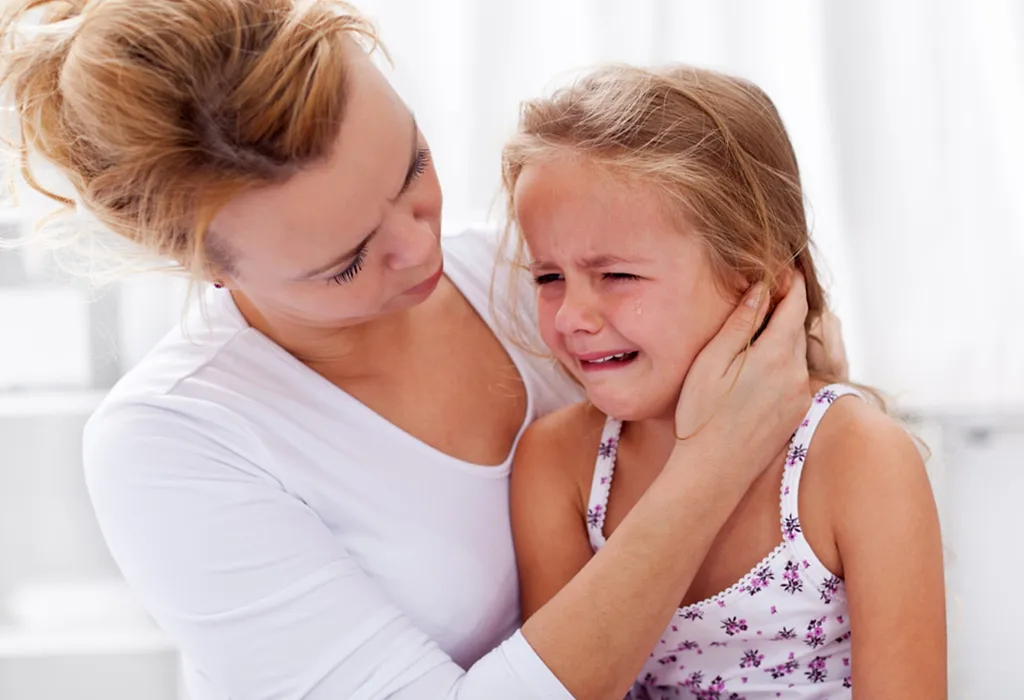

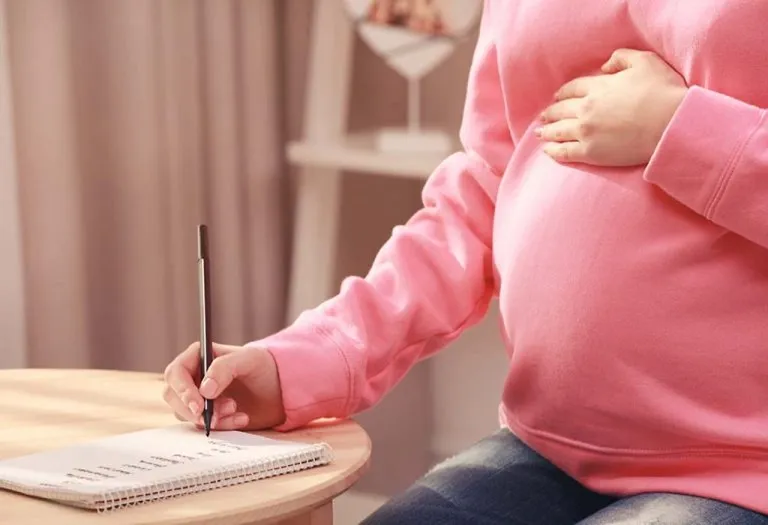
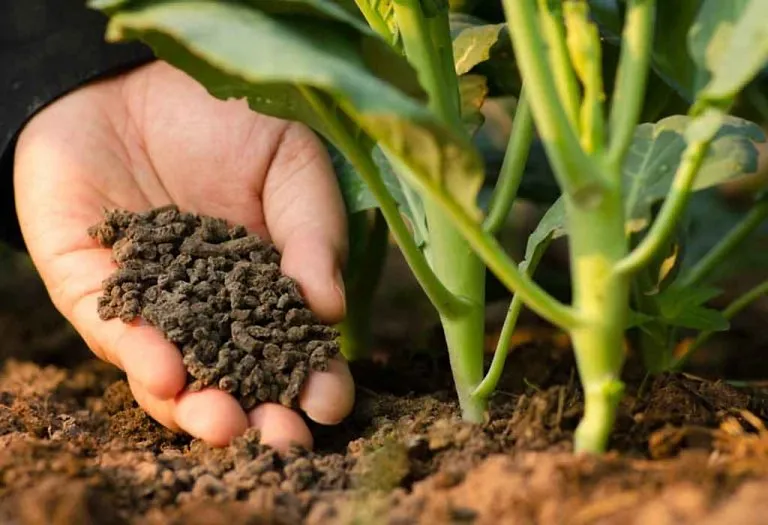
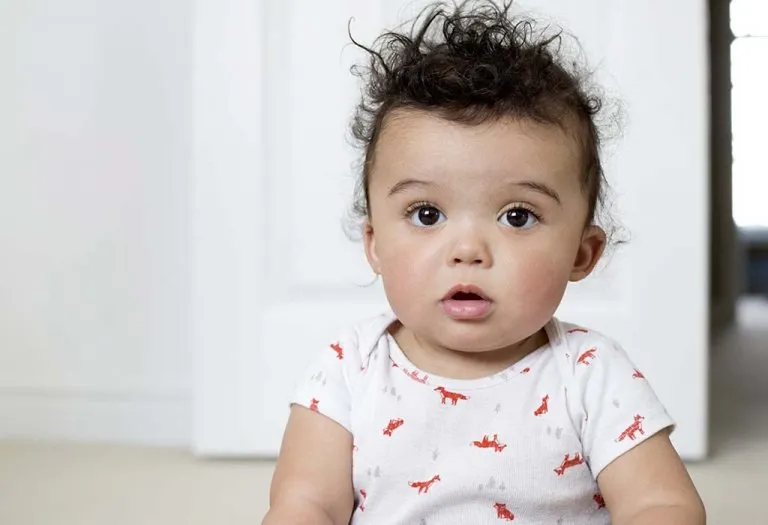



.svg)
















